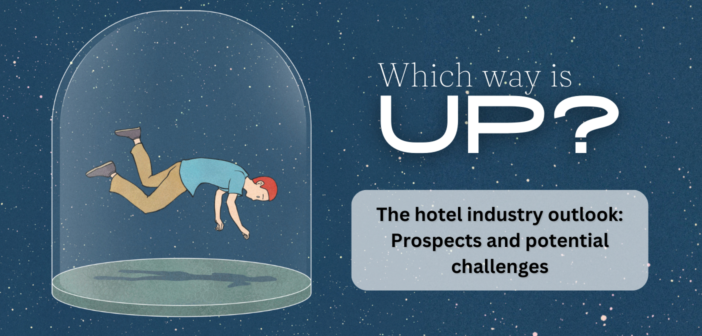The hotel industry outlook: Prospects and potential challenges
by MAHENDRA S. RATHORE
The hotel industry has shown remarkable resilience despite challenges in the macroeconomic environment. In 2023, hotels in the United States have outperformed expectations, with significant growth in revenue per available room (RevPAR) driven primarily by room rates. While leisure travel remains strong, there is a slow resurgence in individual and group business travel, which is expected to contribute to future growth. However, the industry is not without its challenges.
Hospitality research firm STR anticipates an economic slowdown in 2023 but still forecasts slight increases across hotel performance metrics. It projects a 3% bump in RevPAR, which would represent 12% growth over 2019. Despite the challenges, mergers, and acquisitions (M&A) activity in the hospitality sector is expected to remain high. Additionally, the Infrastructure Investment and Jobs Act (IIJA) in the U.S. is expected to drive additional spending on hotels, presenting opportunities for growth.
EMERGING OUTLOOK AND TRENDS: A MIXED PICTURE FOR HOTELS
The hotel industry in the U.S. has experienced a promising recovery in 2023, surpassing pre-pandemic RevPAR levels. Despite a slight decrease in occupancy, average daily room rates (ADR) have increased significantly, driving revenue growth. This positive trend is expected to continue, with anticipated year-over-year increases in RevPAR and ADR. Demand growth from individual business travel and groups is projected to offset any softening in leisure demand, contributing to future growth expectations.
Key drivers of the hotel industry’s brighter outlook
- The continued recovery of the global economy
- Quantum leap of travel tech adoption
- The rise of remote work, which is leading to more people traveling for leisure
- The increasing popularity of experiential travel
- The growing demand for sustainable travel
- Accelerating hybrid business models and leisure travel
- The experiential-based travel habits of Millennials and generations X & Z
- Margins are expected to ease as recession risk dissipates
- Renewable energy sources and sustainability are driving down operations costs
- Deployment of artificial intelligence (AI) chatbots contributing to revenues
POTENTIAL DISRUPTIONS AND CHALLENGES
While the industry outlook is optimistic, several disruptions and challenges loom on the horizon. Here are some key factors that could impact the hotel industry in 2023 and beyond:
Macroeconomic uncertainty: The Federal Reserve’s policy rate increases, bank failures, and liquidity crises have created uncertainty in the public markets. These factors may influence hotel demand and occupancy rates, potentially affecting growth in the coming years.
Geopolitical tensions: These can have a ripple effect on the hotel industry. Changes in international relations, trade policies, or travel restrictions can impact inbound and outbound travel, affecting hotel demand.
 Skilled labor shortage: This ongoing struggle has led to increased labor costs, and some hotels are cutting back on services, as a result, potentially eroding the guest and employee experience, and squeezing profits.
Skilled labor shortage: This ongoing struggle has led to increased labor costs, and some hotels are cutting back on services, as a result, potentially eroding the guest and employee experience, and squeezing profits.
Technology disruptions: The emergence of new technologies – virtual and augmented reality (VR & AR) the internet of things (IoT), and virtual reality (VR) – presents opportunities and challenges. IoT can enhance safety and security, optimize operations, and provide personalized customer experiences. Meanwhile, the metaverse and virtual experiences have the potential to disrupt the industry, particularly in the areas of virtual events, exhibitions, and trade fairs.
Inflation and rising costs: Inflationary pressures and rising operating costs, including labor, energy, and supply chain disruptions, pose challenges to hotel profitability. These factors require hotels to find innovative ways to manage costs without compromising guest experiences.
Sustainability imperative: Travelers are increasingly demanding sustainable travel options. This means hotels need to make significant changes to their operations to meet these demands. For example, hotels need to reduce their environmental impact, source sustainable materials, and offer guests more sustainability-minded choices.
Equity and debt markets dynamics: Interest rates remain sharply higher and mortgage capital significantly constrained due to more stringent underwriting, including lower loan-to-value (LTV) ratios. These have a direct impact on the transaction market, which slowed materially in the second quarter of 2023, with numerous under-contract deals being re-traded or abandoned in the face of rising capital costs. While buyers are facing the harsher realities of the current debt market, there continues to be a strong appetite for high-quality deals and hotels.
Personalization drives guest experiences: Guests seek personalized experiences when they travel and hotels are taking note. We can expect to see more hotels implementing guest preference tracking, which allows them to personalize everything from room amenities to dining experiences. This will not only enhance the guest experience but also increase guest loyalty.
Hotels competitive matrix: Competitive rivalry and revenue-management strategies have ignited intense competition among existing chains. Low switching costs and product differentiation are accelerating higher competition within the industry. With greater price transparency, hotels are enticed to engage in price-cutting strategies to win businesses.
Recession risk: Given continued acceleration of inflation (measure by CPI) is forcing the Federal Reserve to hike interest rates aggressively and making the Fed’s goal of a soft-landing more difficult. A recession likely would provide significant headwinds for hotel REITs as lower consumer spending and business activity – typical during recessionary periods –likely would result in reduced pricing power and lower occupancy rates and margin pressures.
Proliferating brands and amenities creep: Brands are driving increased differentiations, stricter quality assurance and brand management mandates, and enhanced amenities CAPEX on rebranding and refreshes may cause most of the NOI and GOP markings to fork away.
Changing regulatory regimes and regulations: Federal, state, and local regulations and country zoning, ADA, HIPPA labor laws and regulations are growing more stringent and consistent costs –property taxes, insurance, depreciation write downs, amortization, interest, rent, and labor – are increasing as a percentage of incremental revenue that typically will eat into the profit margins.
RECOVERY CONCERNS MAY DAMPEN INDUSTRY OPTIMISM
The hotel industry outlook generally is positive, with projected growth in RevPAR and potential for increased M&A activity. However, challenges such as macroeconomic uncertainty, labor shortages, technology disruptions, and heightened guest expectations for personalized experiences, rising costs will decide the battle between successful and those lagging behind.
Travel seems to still hold sway over consumers’ discretionary spend, but high prices in a softening economy could begin to strain that position. Opportunities exist to attract new travel cohorts, but workplace flexibility only can offset so much financial anxiety. Overall, the travel industry is moving from a year defined by ROI and catapulting into one that will require recalibration and repositioning.
The hotel industry is facing several challenges in the future, blended with a few unforeseen opportunities. Hoteliers who can adapt to the changing landscape and meet the evolving demands of guests will be well-positioned for success. With more moderate revenue growth anticipated for remainder of 2023 and into 2024, there likely won’t be a significant shift in asset valuations until capital costs return to the average levels as prevalent during the pre-COVID years more in alignment with the long-term historical trends.
CAPITALIZING ON THE CATALYSTS
To overcome the challenges and capitalize on the opportunities, hotel owners should:

- Focus on guest experience: The guest experience is more important than ever before. Hotels need to focus on providing guests with a memorable and personalized experience.
- Seize digital differentiation to enhance guest experiences: Customization and specialization will drive niche markets and create value proposition.
- Invest in technology: Technology can help hotels improve efficiency, reduce costs, and provide guests with a better experience. Consider the adoption of technological advancements, such as virtual and augmented reality, and the integration of smart devices in hotel rooms.
- Platform modernization: Prioritize the modernizing of your PMS ,CRM, and reservations platforms and applications. With cloud, 5G, IoT, and other game-changing technologies, you’ll improve efficiency and save money. This also will help shape a creative environment to launch future new products and services in support of changing trends.
- Be ESG sustainable: Sustainability is becoming increasingly important to travelers. Hotels able to demonstrate their commitment to sustainability will be more attractive to guests.
- Sales and marketing transformation: Build capabilities and API integration of different applications to offer an omni-channel experience to guests. Analyze, understand, and respond to your guests with comprehensive and integrated CRM, sales, marketing, and customer-service programs to deliver seamless differentiated experiences and earn customer trust and loyalty.
- Be resilient, responsive, and flexible: The hotel industry is constantly changing. Hotels need to be flexible and adaptable to meet the changing demands of guests.
- Manage talents as an ever-appreciating asset on the balance sheet: Focus on retention by multi-skilling retraining to achieve sustained creativity, innovation, change, and WoW experience and guest loyalty.
 Mahendra S. Rathore, MBA, BA (Honors), CHA® CHE® FHCIMA® CTC® CTA® CFP® PMP®, is a former hospitality industry professional having managed luxury, upscale, and extended stay properties. He is a hospitality, investments, and asset-management transformation leader and a subject matter expert with more than 22 years of global experience with fortune 200 companies and leading industry players across the hotels, resorts, and cruise lines, as well as travel and tourism, and wildlife and ecotourism segments. Through his extensive experience in working with leading hotels chains like Taj Group, Marriott, Hilton, and Historic Palace Hotels and Resorts – along with management consulting with the leading industry planers top innovators and disruptors – his keen insights and expertise enable diverse experiences through all lenses of business. Mahendra offers a unique practical experience to help hotel owners to adapt to new challenges, emerging trends, and emerging nuances in hospitality and asset management businesses. He can be reached at (980)318-9327 or by email at [email protected].
Mahendra S. Rathore, MBA, BA (Honors), CHA® CHE® FHCIMA® CTC® CTA® CFP® PMP®, is a former hospitality industry professional having managed luxury, upscale, and extended stay properties. He is a hospitality, investments, and asset-management transformation leader and a subject matter expert with more than 22 years of global experience with fortune 200 companies and leading industry players across the hotels, resorts, and cruise lines, as well as travel and tourism, and wildlife and ecotourism segments. Through his extensive experience in working with leading hotels chains like Taj Group, Marriott, Hilton, and Historic Palace Hotels and Resorts – along with management consulting with the leading industry planers top innovators and disruptors – his keen insights and expertise enable diverse experiences through all lenses of business. Mahendra offers a unique practical experience to help hotel owners to adapt to new challenges, emerging trends, and emerging nuances in hospitality and asset management businesses. He can be reached at (980)318-9327 or by email at [email protected].




